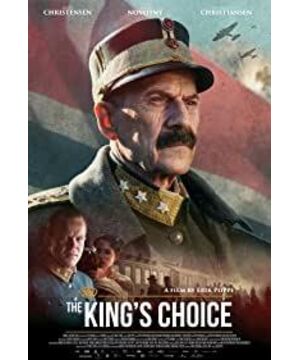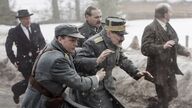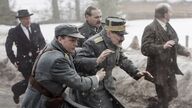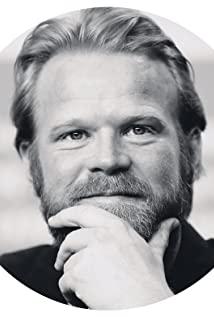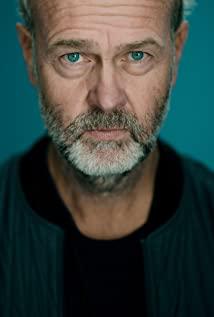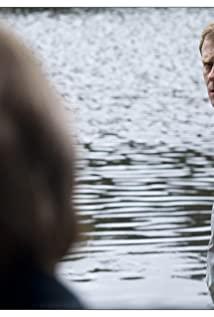If film is compared to fashion, then the film festival can undoubtedly be regarded as an annual fashion show. If there is a trend of style and color in the fashion industry, then Changes in the genre of the world's film industry are also rising and falling like fashion trends. Undoubtedly, the films with the theme of World War II are the most appearing genres in the 89th Oscars competition that has just ended. There have been "Blood War Hacksaw Ridge", "Spy League", "Mine Zone", "War Paradise". Movies that show different aspects of World War II, such as "The King's Choice", have become the most dynamic and watched genres in the world's film industry. In this batch of films, "The King's Choice" shows distinctive characteristics in terms of genre selection and historical narrative. In terms of subject matter and genre, it chooses to integrate historical and biographical genre characteristics to create It has a unique film style and style; in terms of historical narrative concepts and perspectives, it has a unique historical concept and cutting-in angle; in terms of the intention of the film, by shaping the historical figure of the king, it intends to realize the reference to reality Summons to reach ideology. "The King's Choice" reconstructs the creative mode of historical films with unique genre characteristics, meticulous historical narratives and typical character creation, and constructs brand-new historical expressions and historical time and space through film images.
Theme, Type and Style
"The King's Choice" is based on the real historical event of the German invasion of Norway in the Second World War-the "Norwegian Battle". From a more comprehensive subject matter level, it is similar to the series mentioned above. The film belongs to the theme of "World War II" and is an enduring film theme in film history. The reason is that World War II, as a common disastrous memory in the history of human civilization, can resonate throughout the world, and the expression and reflection of history are easier to achieve the depth of thought and human care of the film; the film is represented by the modern nation-state that participated in the war. The object is more able to form the national identity of the nation-state, maintain the "imaginary community", and is more suitable for the expression and transmission of national consciousness. The formation of the clustering effect of films with the theme of World War II in today’s world cinema is not unrelated to the commemoration of the 70th anniversary of the victory of the World Anti-Fascist War in 2015. Whether it is the description of the war or the reflection on the war, it has come to the right time node, which has contributed to it. The emergence of "World War II" theme films so densely.
Although both belong to the theme of "World War II", "The King's Choice" has different genre characteristics from the other several mentioned above. War films are the easiest genre for the theme of "World War II." This type of film focuses on the description of the war process and the performance of the fierce war scenes. In addition, the heroism of the characters is shaped because of the narrative pleasure and visual impact. Has extremely strong commercial value. Biopics are another trend of "World War II" movies. They often show heroes in war. These characters may be war commanders such as General Patton, Churchill, and Stalin who turned the tide, or they may be a legendary sniper. , Spies, or soldiers, this type of character creation often has the characteristics of heroism. In recent years, historical figures have been "defamiliarized", showing the unknown side and showing the small daily life, and pulling the characters off the altar. , Has also begun to degenerate from innovative methods into a conventional type routine. The last type is a relatively serious historical film, with history as the main subject of expression, with characters and plots relegated to the secondary, mainly showing the ins and outs of real historical events. Compared with the above two types, historical films are more biased towards Serious historical writing is more like a historical text written through images. Its appeal is not necessarily the ups and downs of narrative, but the expression of historical outlook and narrative discourse, which is more academically rational.
"The King's Choice" is difficult to accurately locate among the above three types, which also reflects the multiple characteristics of the film's choice of type. From the perspective of genre characteristics, this film is more biased towards the genre characteristics of historical films, but also incorporates the content of biopics. As for the genre characteristics of war films, this has a great relationship with the limitation of the film's subject matter. It will be discussed later. The reason why "The King's Choice" is classified as a historical film is that the film focuses on the historical process of the "Norwegian Battle". The film focuses on the period from April 8th to April 11th, 1940. , The development of the war between Germany and Norway in four days. The film pays special attention to the account of the exact time of the event. The entire film uses subtitles to explain the 14 key time points of the entire event. The subtitles also indicate the location of the event. The accuracy and completeness of the historical description are released. At the forefront of the film. At the same time, the film has the genre characteristics of biopics, but it cannot be completely classified as biopics. Although the film does show the life course of the Norwegian King Haakon VII during the invasion of the country and entering a state of war. It has created multiple figures of the king as a monarch, a father, and a national. However, compared with ordinary biopics, the characters are not the absolute driving force to promote the narrative. More often, the king is in a passive position in the narrative. , And the historical process or the historical narrative on the screen is the main driving force of the film's narrative, and even the historical narrative is the content of the film's performance.
The film uses a variety of methods and styles to construct the screen time and space of historical films. The emphasis on timeliness and authenticity is the most important feature of the film. The film focuses on timeliness all the time. In the first scene of the film’s opening, the director chose hide-and-seek in the snow, a highly indicative action, blindfolded in a snowy world, ha Kang VII is like a lonely soul who has lost his way, starting from the second shot, he walks hard in the snow. Corresponding to the picture is the meaning of the lines. When the opening scene turns from the black field to the picture, it is accompanied by the sound of a tight clock hand turning. In the hide and seek game with the child, Hakon VII kept shouting the countdown number. . On the one hand, it is a warm scene of joy and play with grandchildren, and on the other hand, the emphasis on time (countdown) through the language level, the two reached an excellent counterpoint, pointing the intention of the whole scene to the urgency of the coming war, and The tragedy that happiness is about to disappear. The more important timetable is expanded in the form of subtitles. The time in the 14 subtitles is accurate to the minute. The last two subtitles are separated by less than two minutes in the length of the film. The shortest interval between the narrative historical time is only 30 minutes. The time is highly prominent and highly accurate. The emphasis on time to a certain extent is isomorphic with another feature, which emphasizes the authenticity of the film's narration. The film inserts documentary clips in the paragraphs of the cast and crew list. The clips show real images of Haakon VII, involving life scenes, leading the country, and war mobilization, and have an isomorphic relationship with the narrative content to be shown at the back of the film. , To enhance the authenticity and credibility of the narrative passages with documentary documentary clips. The creation of a sense of reality also originated from the use of documentary photography in the film. In the film, there are many hand-held photography passages. The constantly shaking lens emphasizes the realism of the picture. At the same time, the film has repeatedly used the push button when shooting the characters. This is a common method used in documentary filming, with the intention of creating an authenticity of accidental presence.
Apart from the timeliness and authenticity mentioned above, the overall style of the film is calm and restrained, showing the rigor and heaviness that historical films should have. The soundtrack of the film is very bright. Among them, the string music based on violin and the deep rhythm based on euphonium have become the two most important music styles. String music is used to set off scenes of emotional outbursts, which are often the expression of inner activities, while the bass trumpet creates a sense of crisis all the time. This is best demonstrated in the naval battle section of the first half of the film. The deep trumpet sounds like an undercurrent. Waves hit the audience on the sea, and the depressive feeling of the imminent war is fully apparent. Although the film does not take war scenes as the main object of performance, it also provides an excellent audiovisual presentation of naval battles. The film’s calm restraint also comes from the flashing of subtitles from time to time. The subtitles marking the time and location of the film divide the narrative passages in the film, like the rest in the music score, to achieve the separation of the audience again and again, interrupting the narrative coherence. In order to arouse the audience's attention to the film itself, the constructed historical narrative is thrown to the audience to form a calm observation and thinking. Abandoning the dramatic narrative also requires that the style of the film must be steady and precise in order to withstand scrutiny. At the same time, it also puts forward higher requirements for the authenticity of the image and the credibility of the narrative, which together strengthen the overall style of the film.
Historical narration: Concepts and perspectives
usually have a misunderstanding about historical films. They think that the narrative of historical films is the most effortless, because the historical text has been written. It seems that the narratives of historical films can copy these existing narrative methods. The facts may be exactly the same. On the contrary, because the narrative of historical films does not only involve the dramatic narrative aspect, but also includes a higher level of historical narrative, that is, what historical concept is used to care for historical events and the angle from which to cut into history. This puts great demands on the creators of historical film images. He not only needs to be a veteran screenwriter who is good at dramatic arrangement, because the loss of dramatic historical films can easily become a running account list of events; and the creator must also have High historical literacy and strong ability to think about historical events. After all, repeating other people’s historical narratives lacks new creativity; the last is the courage to express. Historical narratives involve more ideological issues. Breaking through the limitations of expression skillfully is also a manifestation of the talent of the creator.
"The King's Choice" made important attempts in both historical concepts and historical narratives, and tried to bridge the gap between historical truth and historical narrative. As a small Nordic country on the brink of war during the Second World War, Norway's position in the history of World War II cannot be compared with the great powers such as Britain, France, the United States, the Soviet Union, Germany, Italy, Japan, and China. So whether Norway also has the possibility of explaining the war, the answer given by the film is yes. For Norway, the "Norwegian Battle" in World War II was a war that ended in failure. It was a traumatic experience for every individual in this country and nation. This returned to the question that has been debated in the historians—— How the Holocaust of the Jews by the Nazis during World War II will be represented in the historical narrative. The historian Hayden White is skeptical about this issue. He believes that it is difficult for historians to present this event properly because of the limitations of traditional modes of expression. White’s expression model here mainly refers to the fact that traditional classical realism has been unable to express the experience of the social reality of the Holocaust. The characteristics of the event have exceeded the grasp of the language used to describe it or any medium used to express it. . This makes the description of the disastrous historical events in the war itself imprinted with a deep moral and ethical imprint. How to describe it and in what language to describe it has also become a difficult problem in the creation of historical films. In the documentary "The Return of the Five: Hollywood and World War II" just launched on Netflix, Hollywood director Stevens filmed at Dachau Concentration Camp in Germany. He remained locked in a storage room until many years later. There is no courage to experience this tragedy again. Although film creation is not rigorous historical writing, film language is also different from the natural language that forms historical narratives, and the intuitiveness and multi-facetedness of images also have rhetorical characteristics different from natural language, but how to intervene in Norway’s "national disaster history" is still Issues that the narrator must consider.
We can clearly see that "The King's Choice" chose a narrow perspective of the king in its historical narrative, and it may also be composed of Hitler's perspective, the perspective of the soldiers on the war front, and the perspective of the traitor Jisling. And the perspective of ordinary Norwegian citizens. This is the same as Hayden White’s historical narrative: "Time is concocted into a story, by suppressing or demeaning some of it, and highlighting others, by drawing, repetition of themes, changes in tone and perspective. , Alternate description strategies, etc." universal strategies have great similarities. From a narrative point of view, the choice of viewpoint means zooming in and avoiding, zooming in on the content that the viewpoint focuses on, and avoiding the content that you don’t want or cannot show. In "The King’s Choice", the choice of description of the Norwegian "national disaster history" From the perspective of the king, it means to abandon the grand narrative of the German war, and instead present a limited intellectual display to the audience. From the moral and ethical point of view, the narrator chooses the most humanitarian perspective, because the king acts as this The most distinguished people in the country may be at the center of national power, but they will never be at the center of the storm of war. The safety of the characters in the narrative weakens the cruel sense of "national disaster" and killing. Carefully observe the film, and count all the people who appear on the scene. None of these characters have a destiny of death. Even the Sebeka, who is in the grenade, confessed that he was not dead at the end of the film, and even lived to be 85 years old. The historical narrator chose the most humanitarian and morally bridging one in the perspective, avoiding the description of cruel history that is difficult to escape, because once they touch these cruel killings, because the media’s restrictive and expressive power cannot At the height of historical truth, any description may become "modification" and "beautification", subject to moral and ethical torture. Another narrative choice in "The King's Choice" involves the warring Britain. The countries in the "Norwegian Campaign" confronting Germany are in addition to Norway and the United Kingdom. Even the United Kingdom, as the main participant in the war, fought against Germany in Norway. On April 9, 1940, the day the Germans landed in the major ports of Norway, the British fleet and aircraft fought against Germany, and the Germans suffered a heavy blow. In April and October, the British army dispatched a large number of bombers to attack Narvik, sinking 10 German destroyers. The British army then landed in Norway and fought with the German army until June 7 before choosing to retreat. In the film’s historical narrative, the British subjectivity is hidden. The historical narrative of the "Norwegian Battle" has become a struggle between the king and the people, as the philosopher Louis Mink said: "The story is not experienced by people, but told.出的(Story is not lived,
Kings, characterization and ideological summons
After reading the film "The King's Choice", it is hard not to compare with the 83rd Oscar Best Picture "The King's Speech". The two films also involve the character of the king. The image also relates to the attitude of war in World War II. The king's character is also the main line of the film. The two also have many similarities in characterization, but the meaning of the king in the film and the main theme to be expressed are not the same. The character image of King Haakon VII in "The King's Choice" is not as clear as that of King George VI in "The King's Speech". The character image of Haakon VII is cold and deep and full of forbearance. Considering the integrity of the film’s historical narrative, There is not too much emotional color in the characterization, because although the character actors and dynamics contained in the story time are personified in the film, the characters become the subject with intentions, feelings and thoughts, which can make the audience feel the subject Recognition and empathy, but it is obvious that more modifications will be added to the narrative in historical themes, thereby weakening the reliability and rigor of the historical narrative. In order to maintain the consistency of the historical narrative, "The King's Choice" sacrifices to a certain extent The shaping of the character's personality. As a biographical film, "The King's Speech" is the most important aspect of the film. Therefore, the narrative of the film mainly revolves around George VI. The characters also act as the meta-function of action, and the film’s sense of history is relatively Weaker. The characters in the two films are selected according to the type and value of the film. Although the characterization in "The King's Choice" is cut off, it cannot be said that the portrayal of the characters is pale, because a father is like a father. The image of a king is still standing on the screen. In the creation of heroes, modern films often adopt the strategy of reducing "gods" to "people", focusing on the other side of social roles, such as family roles. In the film, Hakon VII is the image of father and grandfather. It adds more dimensions to the characters, especially the paragraphs playing with children, highlighting the loving side of a generation of kings in the limited brushstrokes of character depiction. The shaping of Hakon VII was mainly accomplished through his relationship with his family, especially his son. After sending away the prince and concubine and grandchildren, the conversation on the side of the road is a rare character in the film. Emotional portrayal, through the discussion of the mother, the image of an emotional king appears on the screen. It can be said that although the characters in the film are frugal, the ideal results are achieved wherever they go, and the film is full of emotions without affecting the overall historical narrative.
The image of the king has important symbolic significance both on and off the screen. As dynasty politics is gradually dying out, the royal family and kings have been retained in some countries. In these countries, the king and the royal family are more of a cultural symbol, and they often play a role as a moral symbol in social and political life. The appeal in the film mainly discusses the king's situation and the role he played in response to it in a modern democracy. Especially the film shows the king when the country is in danger of life and death. In the film, Hakon VII adheres to the royal authority, is determined not to involve politics, abides by his own bottom line, and conveys the concept that the creator wants to put on the audience. "All for Norway" is the best summary of kingship, and "in the name of the people" is the declaration of the Norwegian king. On another level, the king is a symbol of the country. The existence of the king leads to the identity of the people. Haakon VII’s refusal to sign at the end of the film is not only a symbol of the king’s expression of his own identity, but also the unity of the people in the king. This is why the film’s historical narrative is not thin. Behind the king stands the entire Norwegian people.
Finally, it can be said that the release of "The King's Choice" is a victory in itself. From the perspective of the country, it is a promotion of national ideology and a reshaping of national cohesion. After the film was released in Norway, it broke the country's record for moviegoers. "All ideologies function through the category of subject, summoning specific individuals as specific subjects." The film's screening, dissemination, and viewing have all ideological functions in the dual operation of the film. The king in the film It is no longer just a character image, but has become an important nut in the ideological state apparatus. He spreads patriotism and national identity among the citizens, and at the same time, the citizens become the main body through its summons. From the perspective of international communication, the spread of "The King's Choice" is also a victory for the Norwegian national ideology. It not only refreshes the world's knowledge of Norwegian films, but may even fill in the knowledge of Norway's experience and role in World War II. , Through the construction of historical narrative, Norway's writing of the history of World War II was achieved, and this narrative was as realistic and persuasive as possible. These may be able to provide more thinking for China as the main country participating in the Second World War. Compared with Norway, we have richer and more profound war materials, a broader film market and industrial base, and the most patriotic. The audience lacks deafening film works. When Norway examines the history of war from the perspective of a character, Chinese films on the theme of the War of Resistance are still immersed in the inferior tricks of tearing ghosts and the entertainment boom of consumer wars. China’s The history of war needs to update image narrative methods and strategies, and the creation of war-themed films in China also needs further reflection.
View more about The King's Choice reviews


